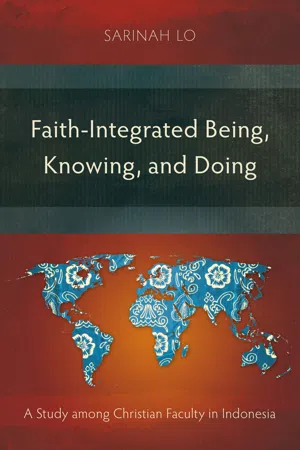
Faith-Integrated Being, Knowing, and Doing
A Study among Christian Faculty in Indonesia
- 276 pages
- English
- ePUB (mobile friendly)
- Available on iOS & Android
About this book
In this holistic study of the integration of faith and learning, Dr. Sarinah Lo challenges the Western tendency to privilege knowing over being and doing. In the context of Indonesian higher education, Dr. Lo addresses the cognitive, a ffective, spiritual, relational, and vocational aspects of human nature. She demonstrates that effective integration of faith and learning must reach beyond the academic disciplines to address the formation of a Christian perspective in all areas of life, thought, and practice.Utilizing in-depth interviews and qualitative analysis, Dr. Lo's field research explores the speci fic challenges facing Christian faculty in Indonesia, where the rise of radical Islam and the pressure to conform to state ideology raise unique questions about the nature of faith-learning integration. The first study of its kind, this is an excellent resource for educators wanting to think more broadly about what it means to follow Christ in the classroom, pushing beyond Western models of integration to embrace the more holistic approach of faith-integrated being, knowing, and doing.
Frequently asked questions
- Essential is ideal for learners and professionals who enjoy exploring a wide range of subjects. Access the Essential Library with 800,000+ trusted titles and best-sellers across business, personal growth, and the humanities. Includes unlimited reading time and Standard Read Aloud voice.
- Complete: Perfect for advanced learners and researchers needing full, unrestricted access. Unlock 1.4M+ books across hundreds of subjects, including academic and specialized titles. The Complete Plan also includes advanced features like Premium Read Aloud and Research Assistant.
Please note we cannot support devices running on iOS 13 and Android 7 or earlier. Learn more about using the app.
Information
Table of contents
- Cover
- Title
- Contents
- Abstract
- Acknowledgments
- Chapter 1 Introduction
- Chapter 2 Literature Review
- Chapter 3 Methodology
- Chapter 4 Findings
- Chapter 5 Discussions and Implications
- Appendix 1 Informed Consent Form
- Appendix 2 Interview Protocol
- Bibliography
- About Langham Partnership
- Endnotes